The GROklahoma Podcast Show
Our podcast takes you on a journey to explore the different resources and support available for clinical and translational research in Oklahoma. We’ll speak with experts in the field, as well as researchers who have benefited from these resources. Join us as we discuss funding opportunities, collaboration tools, regulatory support, and more. Whether you’re just starting out in the field or are a seasoned researcher, our podcast is here to help you discover the resources available to support your work. From access to state-of-the-art equipment to networking opportunities with other researchers and clinicians, mentoring tips, our podcast covers a wide range of topics related to clinical and translational research resources in Oklahoma.
Episodes
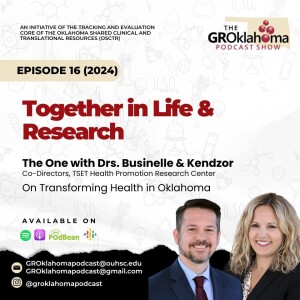
Tuesday Nov 12, 2024
Tuesday Nov 12, 2024
Today, we're honored to host not one, but two powerhouse leaders in health promotion and cancer research: Dr. Darla Kendzor and Dr. Michael Businelle, the dynamic duo behind the TSET Health Promotion Research Center (HPRC) at the University of Oklahoma Health Sciences Center. Not only are they co-directors dedicated to advancing research and reducing health disparities, but they’re also partners in life, bringing a unique synergy to their groundbreaking work.
In this episode, Darla and Michael open up about their journey to Oklahoma, initially drawn by the opportunity to build something big. They reveal how they were “blown away” by the resources available in Oklahoma—a rare chance to make a transformative impact. From expanding their research focus beyond tobacco to addressing issues like obesity, rural health disparities, and cancer prevention, the couple has cultivated substantial growth in HPRC's influence and reach.
Listen in as they discuss the challenges they’ve faced, such as adapting their work for rural communities and overcoming barriers in research funding, and the resilience that’s driven them to continue growing. Darla shares personal insights from her smoking cessation journey and her drive to empower those facing similar struggles. Michael talks about his path, from nursing and engineering to psychology and mobile health, showing how adaptability has been essential in his career.
Their story goes beyond professional highlights—they share how collaboration in research and marriage has shaped their lives, offering a rare glimpse into the balance of personal and professional partnership. For anyone passionate about health promotion, research, or simply finding inspiration to drive change in underserved communities, this episode is a must-listen!
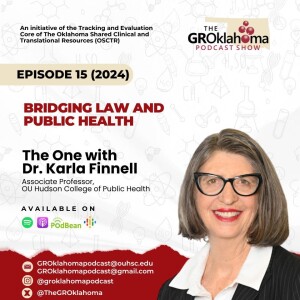
Monday Oct 28, 2024
Monday Oct 28, 2024
In this episode of the GROklahoma Podcast, we had the pleasure of speaking with Dr. Karla Finnell, an Associate Professor at the University of Oklahoma Hudson College of Public Health. Dr. Finnell shared her inspiring journey from growing up in Comanche, Oklahoma, where her father worked in the oil fields and served as a rodeo judge, to her transformative experience in education when a professor’s small act of kindness—a full tuition scholarship—changed her life. Her path led her from practicing agricultural bankruptcy law to advocating for healthcare access in underserved communities and ultimately to championing health equity.
We discussed her passion for research on disparities and the need to redesign systems to promote equity. Dr. Finnell shared her insights on how inclusive systems can be built through community engagement, fostering trust, and rethinking privileges. She highlighted the importance of mentorship, especially for first-generation students, and encourages collaboration across disciplines in research. She left us with a powerful question: "How do we create and foster more multidisciplinary research?" Join us for an insightful conversation on public health, social justice, and the transformative impact of education. It was an inspiring and thought-provoking conversation, and we are grateful to Dr. Finnell for sharing her journey and wisdom with us.
Tune in for a deep dive into public health, social justice, and the transformative power of education. If you would like to be a part of the podcast, please send us an email at groklahomapodcast@ouhsc.edu
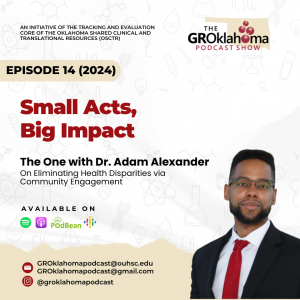
Tuesday Sep 17, 2024
Tuesday Sep 17, 2024
Welcome (back) to the GROklahoma Podcast, we are honored to feature Dr. Adam Alexander, an Assistant Professor in the Department of Family and Preventive Medicine at the University of Oklahoma College of Medicine and Faculty at the TSET Health Promotion Research Center. Dr. Alexander brings his unique blend of empathy, cultural competence, and cutting-edge research to the table. A native of Memphis, he has dedicated his career to eliminating cancer-related health disparities, particularly among African Americans and socioeconomically disadvantaged populations. His work spans developing mobile health apps that make cancer screening more accessible to building deep, trust-based relationships with faith-based communities.
Dr. Alexander shares how his success lies in listening to the communities he serves: “If I'm speaking more than listening, I'm doing something wrong.” From respecting the nuances of faith-based communities to balancing the rigor of research with real-world flexibility, Dr. Alexander emphasizes that true progress happens when people feel seen and respected.
This episode dives into the small but powerful actions that make a big impact—like sending a thank-you email after community events or answering calls after 5 p.m., Dr. Alexander also discusses the challenges of working with populations experiencing homelessness and serious mental illness, where human connection is key to ensuring interventions succeed. Tune in to discover how empathy, cultural sensitivity, and collaboration drive healthcare innovations—and how small actions can change lives.
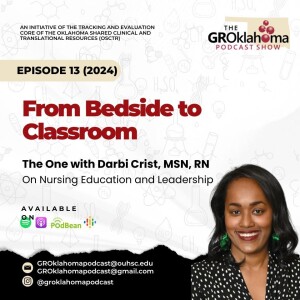
Wednesday Aug 21, 2024
Wednesday Aug 21, 2024
This episode of the GROklahoma Podcast features Darbi Crist, a dedicated nurse educator and Oklahoma native with a rich background in postpartum care. Darbi shares her inspiring journey from aspiring sports trainer to becoming a third-generation nurse, reflecting on how her Guyanese roots have shaped her global perspectives and commitment to personal growth. She also talks about the fulfillment she finds in nursing, particularly in simulation, and how she is preparing the next generation of nurses through hands-on, technology-driven training.
Darbi’s teaching approach is rooted in open communication and a genuine interest in her students’ diverse cultural backgrounds, fostering a welcoming and inclusive environment in the classroom. As a mother of two, she candidly discusses the joys and challenges of balancing family life with a demanding career, highlighting the importance of being present for her children and setting boundaries to prioritize family time.
Throughout the conversation, Darbi emphasizes the need for multidisciplinary research and the power of belief in driving change. Her reflections on embracing Black identity in academia and navigating neurodiversity add profound depth to the discussion. This episode is a rich exploration of personal and professional growth and a testament to the power of persistence, adaptability, and the pursuit of excellence. Give it a listen!
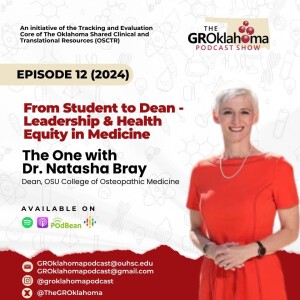
Thursday Jul 25, 2024
Thursday Jul 25, 2024
In this episode, we sit down with Dr. Natasha Bray, the Campus Dean at OSU College of Osteopathic Medicine at the Cherokee Nation in Tahlequah, OK. Dr. Bray shares her journey from medical student to dean, her passion for health equity, and her leadership in medical education. She discusses her early life in Oklahoma and how her father’s medical practice influenced her commitment to healthcare and community service. Her educational path took her from Montessori school to the Oklahoma School of Science and Mathematics, and later to the University of Tulsa and Oklahoma State University College of Osteopathic Medicine.
Dr. Bray talks about the challenges she faced in her career, including transitioning from surgery to internal medicine and overcoming gender biases. She emphasizes the importance of diverse perspectives in medical education and shares strategies for creating inclusive learning environments. Dr. Bray highlights her initiatives in health equity research and community health, underscoring the need for systemic changes to support these efforts.
Mentorship and professional development are central to Dr. Bray’s approach. She offers insights on building effective mentoring relationships and encourages young professionals to embrace challenges and opportunities. Dr. Bray also addresses the future of medical education, particularly in the wake of COVID-19, and the importance of adapting to different learning styles. Throughout the episode, listeners are reminded of the value of embracing the messiness of mentorship and personal growth - you don’t want to miss it!
Many thanks to Dr. Mark Doescher for recommending this guest.
Wanna feature on the podcast? Email us on groklahomapodcast@ouhsc.edu or click here to begin: https://ousurvey.qualtrics.com/jfe/form/SV_1ENgRC4uewSZetg
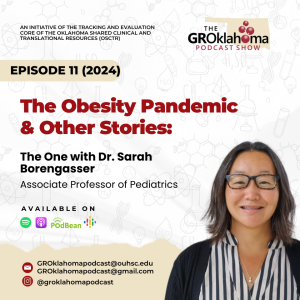
Monday Jun 17, 2024
Monday Jun 17, 2024
In this episode, we spoke with Dr. Sarah Borengasser, an Associate Professor specializing in endocrinology and diabetes at the University of Oklahoma Health Sciences Center. Dr. Borengasser shared her journey from being adopted from Korea and growing up in Mason City to becoming a distinguished researcher in obesity, nutrition, and exercise science, driven by her passion for running and exercise. Her research, supported by consistent NIH funding, employs advanced multiomics techniques to identify molecular biomarkers affected by environmental exposures, particularly in epigenetics. Dr. Borengasser explained her research in accessible terms, emphasizing her mission to promote public health through improved nutrition and physical activity. She discussed combating the global obesity pandemic with personalized lifestyle approaches and we explored topics such as GLP-1 agonists and epigenetic age acceleration, considering how diet and exercise can potentially reverse aging processes. She also highlighted the evolving role of artificial intelligence in obesity research, emphasizing the fusion of biological and behavioral sciences.
On a personal note, Dr. Borengasser discussed her family's transition to Oklahoma and the strategies they've adopted to balance her professional and personal life effectively. Her dedication to mentoring emerged as she reflected on the rewarding experiences of guiding young scientists and shared strategies for maintaining resilience in her career. Beyond research, Dr. Borengasser contributes to enhancing communication among researchers through a TED-like talk series, advocating for effective scientific communication.
In conclusion, Dr. Borengasser envisioned precision lifestyle research as transformative for public health, showcasing her groundbreaking contributions to clinical and translational research. We thank Dr. Borengasser for sharing her expertise and look forward to future conversations with her and other inspiring researchers and those who support them.
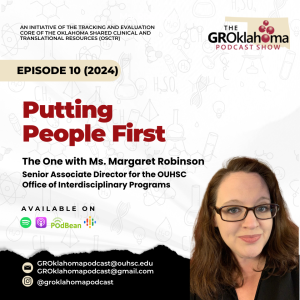
Friday May 31, 2024
Friday May 31, 2024
In this episode of the GROklahoma podcast, we're thrilled to have Margaret Robinson, the Senior Associate Director for the OUHSC Office of Interdisciplinary Programs, as our guest. Margaret's journey from rural Los Angeles, CA to Oklahoma is extraordinary, and she brings a wealth of expertise in fostering interdisciplinary learning experiences and facilitating faculty development. With a keen focus on student engagement and community partnerships, she tirelessly works to break down barriers to healthcare access for Oklahoma's medically underserved populations. Holding a Master of Education in adult education, Margaret is a beacon for diversity and collaboration, advocating strongly for the scholarship of teaching and learning.
Margaret's journey is not only marked by professional accomplishments but also by her resilience in handling life's unexpected twists and turns. From pivoting her career path to accommodate caregiving responsibilities to navigating the challenges of pursuing education in different fields, Margaret's story is a testament to the power of adaptability and perseverance
During our conversation, Margaret also shared her deep appreciation for Oklahoma, highlighting its beauty, diverse culture, and warm-hearted people. In her leisure time, she enjoys road trips with her family and exploring Oklahoma's state parks.
Join us as we explore Margaret's insights on interdisciplinary collaboration, community engagement, and her remarkable journey through life's pivots.
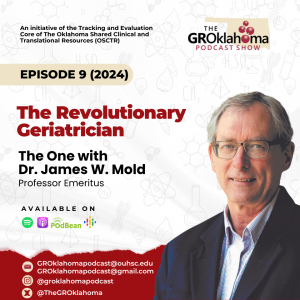
Tuesday Apr 30, 2024
Tuesday Apr 30, 2024
In this episode of GROklahoma podcast, we are honored to host Dr. James Mold, the George Lynn Cross Emeritus Professor in the Department of Family and Community Medicine at OUHSC. Dr. Mold's journey from rural Ghana to Oklahoma is nothing short of extraordinary. His dedication to healthcare, particularly in geriatrics, has left an indelible mark on the field.
The episode explores Dr. Mold's upbringing, early medical experiences, and pivotal career moments. From his formative years in Durham and the University of Michigan to transformative experiences as a physician in Ghana, listeners gain insight into the motivations driving Dr. Mold's medical journey. Transitioning to the US, his career ranged from private practice to academia at OUHSC. His focus on geriatric care led to the establishment of the Oklahoma Geriatric Education Center and the Oklahoma Center on Aging, reflecting his commitment to improving healthcare for the aging population.
Throughout, Dr. Mold shares invaluable insights drawn from his extensive career, emphasizing person-centered care, interdisciplinary collaboration, and community involvement in healthcare. His advocacy for goal-oriented care underscores his dedication to making healthcare more humane and effective.
Reflecting on retirement, Dr. Mold's enduring optimism and fervor for healthcare advancement inspire listeners. His vision, integrating emerging technologies with patient-centric approaches, serves as a guiding light for aspiring healthcare professionals.
In his leisure, Dr. Mold enjoys quality time with family, walks with his dog, consulting, writing, studying Spanish, and playing the banjo.
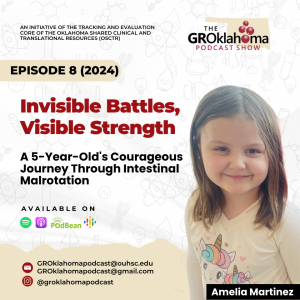
Saturday Mar 23, 2024
Saturday Mar 23, 2024
In our previous episode, we delved into an insightful conversation with Dr. Sydney Martinez and Dr. Corcoran, exploring their impactful work in community-engaged research inspired by their children’s battle with intestinal malrotation. For those just joining us or needing a refresher, we highly recommend revisiting that enlightening discussion as it perfectly sets the stage for today's exploration.
In this episode, we reconnect with Dr. Martinez to discover the latest developments since our last session. Excitingly, we introduce a new and spirited voice to the podcast—Amelia, the very heart of Dr. Martinez's motivation and passion for her work. Amelia, the vibrant and brave 5-year-old, joins us too! She's here alongside her mom to share her own journey and how she's been advocating for herself and others, even at her young age. Together, they embody the spirit of community-engaged research and advocacy, showcasing the power of resilience and collective support in facing health challenges.
We hope that this episode has provided valuable insights, particularly in shedding light on the patient's perspective regarding intestinal malrotation, as exemplified by the experiences of a young child like Amelia. Her resilience and perseverance are truly inspiring. We also hope to continue amplifying the voices of those facing invisible illnesses, acknowledging that each story possesses the power to create a meaningful impact.
Connect with their malrotation community below:
Facebook: https://www.facebook.com/profile.php?id=61552410669693&mibextid=dGKdO6
Email: intestinalmalrotation@ouhsc.edu
IMPOWER paper: https://rdcu.be/dBLbV
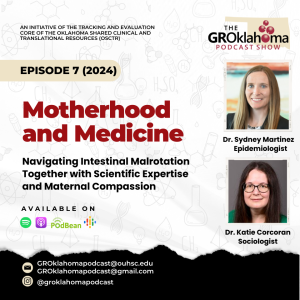
Saturday Mar 23, 2024
Saturday Mar 23, 2024
Being a new mom is tough but imagine having a newborn with health challenges beyond the ordinary. Today, we introduce you to Dr. Sydney Martinez and Dr. Katie Corcoran, two moms and researchers deeply immersed in unraveling the complexities of intestinal malrotation. Dr. Sydney Martinez, an Assistant Professor in Epidemiology at the University of Oklahoma Health Sciences Center, and Dr. Katie Corcoran, a prolific researcher and professor of sociology at West Virginia University, share their tales of resilience, determination, and the power of community in tackling this condition.
Intestinal malrotation, a rare condition diagnosed within two weeks of birth in both their newborns, involves the intestines failing to rotate correctly during development, leading to severe gastrointestinal issues.
In this riveting episode, they recount their journey of resilience and community-driven research through the Intestinal Malrotation Patient Outcomes and Wellness Registry (IMPOWER). Through their unique blend of scientific expertise and maternal compassion, they challenge the medical community's assumptions about how surgical outcomes do not always translate to positive patient experiences, highlighting the need for a holistic approach to understanding and addressing malrotation.
In this episode, discover how community support has been pivotal in driving meaningful, patient-driven research through IMPOWER, and explore the potential of emerging technology in uncovering patterns related to intestinal malrotation.
Connect with their malrotation community below:
Facebook: https://www.facebook.com/profile.php?id=61552410669693&mibextid=dGKdO6
Email: intestinalmalrotation@ouhsc.edu
IMPOWER paper: https://rdcu.be/dBLbV

The GROklahoma Podcast Show
Join us on The GROklahoma Podcast Show as we explore the world of clinical and translational research in Oklahoma. Discover resources, funding opportunities, collaboration platforms, and more to support your research journey. Whether you're a seasoned researcher or just starting out, our podcast connects you with the tools and expertise to propel your work forward. Subscribe and join our community of researchers pushing boundaries and making a difference in Oklahoma's research landscape.







